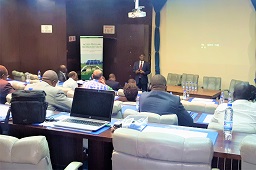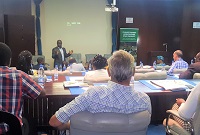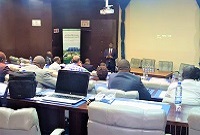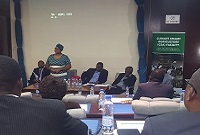
The ZADT organized a Round Table Discussion event which was held on the 27th of March at the CABS Head Office Auditorium in Borrowdale. In attendance where representatives from Ministry of Agriculture, Industry, Research Institutions, Financial Institutions and other development institutions supporting agriculture in Zimbabwe.



A summary of the discussions held which were based on the keynote presentation from the Ministry of Lands, Agriculture, Water, Climate and Rural Resettlement are as indicated below.
The summary presents highlights on lessons learnt from past droughts, implications of the current drought, mitigatory responses and suggested recommendations/Way forward.
|
Highlights from the presentation by the Ministry of Lands, Agriculture, Water, Climate Change and Rural Resettlement |
Issues arising from Discussion |
Recommendation/Way forward |
|
· Inadequate rainfall resulting in poor pasture conditions
· Increased livestock deaths from disease incidences
· Increased poverty as livelihoods of the poor are affected by low agricultural production
· Reduced levels of water availability in water bodies affecting irrigated agriculture
|
· The National Early Warning Unit should be resuscitated. This helps in translating information from Climate and Weather monitoring bodies such as FEWSNET into usable information by smallholder farmers. Relevant Ministries will then take up the information and advice their stakeholders.
· There is need to adopt more effective information dissemination mechanisms (packaging) so that it gets to the intended recipients in a usable format. Should consider the use of Information Communication Technology (ICT), pamphlets, demonstrations or partnering with other service providers such as Eco farmer etc.
· Farmers used to have their own early warning systems where they would interpret natural phenomena and integrate that into their decision making. This needs to be harnessed and strengthened with coordinated scientific information communication.
|
· Resuscitate/Strengthen and capacitate the National Early Warning Unit to embrace information technology (ICTs) and collaboration with the private and development sector to ensure proper packaging, coordination and communication of information
· Action plans to mitigate against national disasters such as droughts, veld fires, disease outbreaks, floods etc required to be proactive and not reactionary.
· Capacity building of Extension Services and disaster mitigation Task Force Units to support smallholder agriculture diversification and sustainability, as well as preparedness to cope with national disaster situations.
|
|
Lessons learnt from previous droughts |
Issues arising from Discussion |
Recommendation/Way forward |
|
The following lessons were pointed out;
· Entrenchment of rural poverty due to lose of capital and productive assets through crop failure and livestock deaths
· Stagnation or deterioration of rural households’ incomes and development
· Emigration of people from rural areas to urban centres and/or other countries
· Low life expectancy being caused by malnutrition and stressful effects of drought induced loses
· Emergence of alternative livelihood options such as mining and vending
· Proliferation of anti-social behaviour such as poaching, crimes and robbery
|
· How are farmers in other countries with similar drought conditions managing? There is need for research into this.
· Resource use should be prioritized. Not all people who stay in rural areas are farmers. The rural households should be classified or categorized to facilitate appropriate targeting of developmental or relief programmes.
· Government should find ways to steer the economy away from dependence on unsustainable production systems such as tobacco. |
· Learn, adopt and adapt relevant practices which other countries in similar circumstances are doing.
· Unpack the needs of rural households as a precursor for structuring targeted programmes.
· Establish and develop value chain support systems suitable for cropping and livestock enterprises for specific regions.
· Provide funding for targeted research to adopt and use locally available resources and genetic materials to address issues of drought.
· Mobilise resources and funding for the drought mitigation initiatives. |
|
Implications of current drought |
Issues arising from Discussion |
Recommendation/Way forward |
|
· Shortage of food in drier areas of the country
· Livestock deaths due to shortage of suitable and affordable animal feeds
· Loss of market competitiveness in agricultural produce due to effect of droughts
· 2.4 million people will be food insecure. Comprising of 51% of rural households. Southern part of country hardest hit.
|
· Smallholder farmers overly rely on government even on initiatives which they could do on their own to salvage their crops or animals.
· It appears the dignity of the smallholder farmer has been eroded to a point they are now ‘wired’ to believe that somebody has to do everything for them. |
· Government, NGOs, Development partners and Private sector should collaborate to adopt practices which restore the dignity and mindset of smallholder farmers to be proactive in spearheading initiatives which affect their own livelihoods. |
|
Mitigatory responses |
Issues arising from Discussion |
Recommendation/Way forward |
|
· Mobilisation and provision of Food Aid to both vulnerable urban and rural households.
· Drilling of boreholes. Government is targeting 350 boreholes throughout the country. A further 500 boreholes to be drilled under the Chinese Aid facility.
· Need for supplementary feeds to sustain livestock, veterinary medicines for disease control and livestock management, strengthened technical and extension services especially for smallholder farmers.
|
· There is significant amount of molasses which is being exported as well as being channelled into ethanol production. This could be used for manufacturing affordable and suitable livestock feed. Chicken waste can also be used for manufacturing livestock feed. Agricultural waste should be recycled as organic fertilisers to reduce fertiliser costs for crop production.
· As a country we have reactive responses to drought instead of having properly planned approaches.
· The concept of special economic zones should be applied to agriculture as it is done in industry.
· Command agriculture initiative should also cover for small grains which do better in the drought-stricken areas. Maize is suitable for high rainfall areas.
· Drought is now being defined in terms of amount of precipitation instead of amount of water which remains in the soil. There is need to embrace nature path. What makes trees survive even in drought years? We may need to learn from that.
· There is need to improve water use efficiency in the light of its scarcity. Promote climate agriculture practices (CSA) such as conservation agriculture and adopt efficient irrigation systems. Need to develop technologies which support CSA currently viewed as laborious.
· Land scape and hydromorphic management practices for food production and preservation of water tables.
· Improvement in catchment area management to arrest land degradation and restore environmental resilience.
|
· Develop a drought policy in view of the increased frequency of its occurrence in Zimbabwe. This should guide the development of action plans for the different sectors.
· Set up an Emergency Relief Fund. This will help in preparedness instead of reactive responses.
· Establish a targeted crop and livestock insurance scheme.
· Resuscitate the National Irrigation Support Fund to steer investment in irrigation infrastructure.
· Government should stop exportation of molasses and other relevant agricultural by-products and channel these into manufacturing of livestock feed.
· Establish Special Agricultural Economic zones to support specific value chains where there is comparative and competitive advantage even at smallholder farmer level.
|

